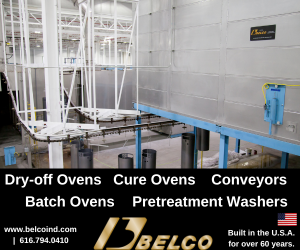Ineffective Cleaner
We can clean hot-rolled P&O; on that material the slimiest, oiliest stuff cleans just fine, but the seemingly cleaner CRS will not clean up with our alkaline cleaner. We are water break-free after phosphate because of the acidic nature of the stage, but two things are happening: One, we are compromising the effective stage dwell time of our third stage because it has to clean before it can deposit phosphate, and two, we are trashing our third stage with an excess amount of soils.
Q. I have a five-stage wash with conventional pretreat chemistry: alkaline clean, rinse, iron phosphate, rinse, rinse.
This past season we have suddenly found ourselves at the mercy of cold-rolled sheet steel. We can clean hot-rolled P&O; on that material the slimiest, oiliest stuff cleans just fine, but the seemingly cleaner CRS will not clean up with our alkaline cleaner.
We water break after the cleaner stage, and our phosphate stage has to finish the job. We are water break-free after phosphate because of the acidic nature of the stage, but two things are happening: One, we are compromising the effective stage dwell time of our third stage because it has to clean before it can deposit phosphate, and two, we are trashing our third stage with an excess amount of soils. D.O.
A. It is not unusual for the chemicals used in a washer to become ineffective as steel suppliers and manufacturing processes change over time. This is the reason you should have a very close relationship with your chemical supplier.
The supplier should constantly monitor the soils on your substrates and make adjustments to your process or chemicals to remove them. For instance, your cold-rolled steel may have paraffin -based soils on the surface. These require higher chemical temperatures, higher chemical strength, higher nozzle pressure, and so on to effectively remove them.
Furthermore, some soils are better removed with alkaline chemicals and some are better removed with acid-based chemistries. This is why most chemical suppliers use a “cleaner-coater” combination chemistry in the third stage to remove any soils left on the surface from the first (alkaline) stage. You can also increase the coating weight of the iron phosphate by increasing the chemical concentration in this stage. This will ensure that you will experience the same corrosion protection and coating adhesion as your other substrates.
Related Content
-
Adjusting Current and Voltage When Powder Coating
Which manual powder coating gun setting is better to adjust, voltage or current? Jeff Hale of Gema USA discusses when to use different settings on your powder gun to achieve optimal results.
-
Low-Temperature-Cure Powder Coatings Offer Unique Opportunities
An in-depth look at the advantages of low-temperature-cure powder coatings and the considerations for incorporating them into your process.
-
Products Finishing Reveals 2023 Qualifying Top Shops
Each year PF conducts its Top Shops Benchmarking Survey, offering shops a tool to better understand their overall performance in the industry. The program also recognizes shops that meet a set of criteria to qualify as Top Shops.















